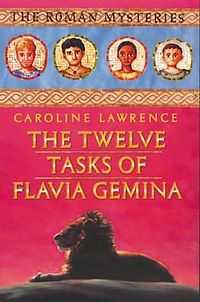The Twelve Tasks of Flavia Gemina
|
First edition, 2003 | |
| Author | Caroline Lawrence |
|---|---|
| Cover artist | Peter Sutton |
| Country | United Kingdom |
| Language | English |
| Series | The Roman Mysteries |
| Genre | Historical novel |
| Publisher | Orion Books |
Publication date | 19 June 2003 |
| Media type | Print (Hardback & Paperback) |
| Pages | 208 pp (first edition, paperback) |
| ISBN | 1-84255-020-9 |
| OCLC | 59549239 |
| Preceded by | The Dolphins of Laurentum |
| Followed by | The Enemies of Jupiter |
The Twelve Tasks of Flavia Gemina is a children's historical novel by Caroline Lawrence, published on June 19, 2003. The sixth book of the Roman Mysteries series, it is set in Ostia in December AD 79, during the Saturnalia. Its central themes are love and marriage.
Title
The title is a reference to the Twelve Labours of Hercules.
Plot introduction
The action of the novel takes place in the Roman port of Ostia during a winter festival. Inspired by a dream about Hercules, Flavia persuades her friends to gather gossip from all over Ostia to solve the mystery of Cartilia Poplicola, and thus break up her romantic relationship with Flavia's widowed father Marcus.
Plot summary
The novel is set three months after The Dolphins of Laurentum and six months after the children solved their first mystery. The Geminus household is still suffering financially from the loss of the Myrtilla. It is winter AD 79 during the five-day festival of the Saturnalia, a time when the status quo is upset. Ostia is further excited by the escape of some exotic wild animals, possible man-eaters. The children narrowly escape an alarming-looking bird.
Flavia is disturbed when her father Marcus starts talking about her betrothal and insisting that she should stop running around Ostia playing detective with her unconventional friends. She blames her father's change of attitude on his new ladylove, Cartilia Poplicola, and is determined to prove that the widow is a fortune-hunter, a witch, or even a murderess.
Several signs, including a dream, make Flavia believe that following a trail guided by the twelve labours of Hercules will lead her to the truth. These are generally places in Ostia, such as the Hydra fountain and the Atlas tavern, but also events like the capture of the escaped lion or people such as the gladiator nicknamed the Cretan Bull. Flavia and the others pick up scraps of news and gossip about Cartilia and her family which they try to piece together.
The detectives meet Cartilia's sister Diana and eventually discover her secret love for Aristo, which explains some strange events and clears Cartilia of wrongdoing. However, uncovering another secret destroys Marcus's trust in Cartilia, and Flavia is unexpectedly unhappy about it.
A fever sweeps through Ostia and many fall sick, including Flavia and Marcus. The first wave of sickness, however, is just the precursor of a more deadly plague which will be important in the seventh book, The Enemies of Jupiter.
Characters
In this novel, Flavia is even more headstrong and imperious than usual, but shows signs of learning from her errors in judgement; Lupus shows his cunning in dice games, his love of trailing people and his skill at art; Nubia shows her courage in helping to capture the lion and a quiet patience which encourages people to talk more than Flavia's questions; Jonathan shows his loyalty in supporting Flavia even when he thinks she is wrong, and surprises himself at his boldness in going to some of the odd places she sends him.
Themes
The main themes are love and marriage. The book opens on the lefa day of Miriam's betrothal feast and ends on her wedding day. The main story concerns the romance between Marcus and Cartilia, who have both been married before, and Flavia's belief that Cartilia's love is not real. The subject of Flavia's betrothal is raised; although she is only ten and will perhaps not marry for five or six years, Marcus is considering a possible match with a Roman senator's son. Divorce is also mentioned, with a man divorcing two women for not being able to give him children.
Unrequited love is shown in Diana and Nubia's infatuation with Aristo, Aristo's with Miriam and Flavia's with Felix. Even Lupus is a little smitten, with Diana. The gladiator Taurus makes a good profit selling his sweat to make love potions, and many maidens come to dance away the effects of Cupid's arrow, or "the spider's bite" of love by dancing the Tarantella.
The traditions of the Saturnalia recur throughout the novel, with the festivities in the streets, the choosing of the king, the disruptions to the usual routines, special foods and gift giving.
External links
| ||||||||||||||||||||||||||||||
